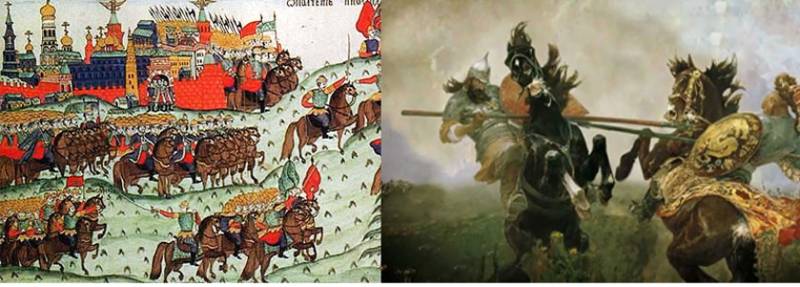Military Glory Day: Battle of Kulikovo and unanswered questions
The situation is aggravated by the appearance of numerous "alternative" versions of those events that, it would seem, are described quite clearly and clearly. Among the topics that continues to excite the minds of historians is the theme of the Mongol-Tatar invasion of Russia, developments of 600-800 years ago. It must be noted that there is enough speculation on this subject.
Today we are not going to delve into speculative and conspiracy theories, but simply recall that the 21 of September marks the Day of Military Glory in our country. This is the Victory Day of the Russian regiments under the command of Prince Dmitry Donskoy on the Kulikovo field. This is a battle that was included in Soviet and Russian history textbooks and which is actively discussed hundreds of years after that date from the 1380 year.
The battle took place between the regiments of Dmitry Donskoy and the forces of the so-called West Volga Horde - the temnik of the Golden Horde of Mamai. According to the chronicles, the Russian side put up to 70 thousand warriors, the Horde - up to 140 thousand. At the same time, noteworthy are the notes in the annals, where, talking about the Horde army, chroniclers mention such an interesting fact as the participation in the battle on the Kulikovo field of the Genoese infantry. According to some reports, these were Mamaia's European mercenaries, who tried to resist a decrease in their level of influence after a series of defeats of the troops sent to them. One of such defeats, an army controlled by Mamaia (the tumens of Murza Begish) suffered in 1378 on the river Vozha.
It can be stated that the European "partners" in those ancient times did not hesitate to oppose Russia (Russia), seeing this as a benefit, first of all, for themselves. Indeed, despite the decrease in the level of influence of Mamaia, his treasury was by no means empty, and to the same Genoese infantrymen who appeared on the Kulikovo field among the Horde troops, he, according to the chroniclers, paid pretty much.
But Mamaia was not helped by either Genoese foot soldiers, nor trained Circassian warriors, nor cavalry from the Tatar lands. His army on the Kulikovo field was defeated, which led to the beginning, so to speak, of a new stage in the relations between Russia and the Horde.
What questions do specialists still have unambiguous answers?
Sometimes not only unambiguous answers, but also answers in general.
Firstly, this is the complete absence of any artifacts of that battle - arrowheads, spears, armor, etc. Secondly, the problem with the lack of human remains, and in fact on the battlefield tens of thousands of people died. One of the versions is the chronicler’s phrase that the battle took place on the Don at the mouth of Nepryadva does not quite correspond to the real geographical location of the Kulikov field, and therefore the field itself is still not identified exactly. Another version - all the metal objects for hundreds of years have been collected from those places, and human remains (including bone) have been lost due to the high chemical activity of chernozem.
Whether all this is true or not, is a new reason to engage in scientific research using the most modern technologies.
But by and large, the fact remains: the year 1380 became the year in the history of our country, when the independence of the Moscow princes began to grow significantly, which ultimately allowed the unification of Russian lands around the city, which today is the Russian capital.

Information